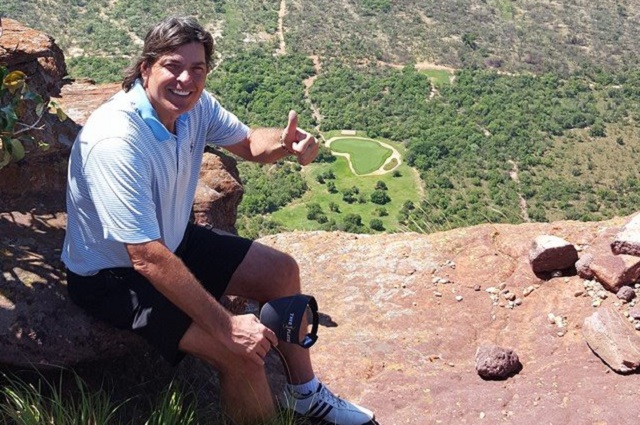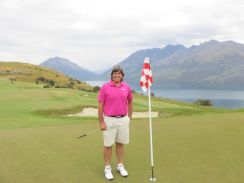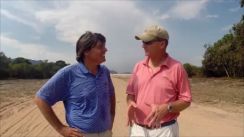
With Olympic Golf Gold Medalist Justin Rose and his Gold Medal in the evening of Sunday, August 14th, 2016 in Rio at the Olympic Golf Course!
Olympic Golf is Back and it’s Great!
There is only one Olympic Gold Medalist, Champion Golfer of the World for the next Four Years.
For the women that one golfer is South Korea’s Inbee Park. For the men that one golfer is Great Britain’s Justin Rose.
Olympic Golf is an Olympic Sport once again after ending a dormancy of 112 years with a beautiful and spirited rendition of men’s and women’s competitive golf at the Rio 2016 Summer Olympics.
The competitions were held on the newly constructed Olympic Golf Course, locally known as the Reserva de Marapendi, in Barra da Tijuca, an upscale suburb in the city of Rio de Janeiro, Brazil. The golf course, just a raw playful sandbox three years ago, was designed by the talented architect Gil Hanse and his right hand man Jim Wagner. They partnered with World Golf Hall of Famer member Amy Alcott to insure as fair and challenging a test for the women as what was conceived for the men. Their consultation and the resulting design—a combination of Scottish Links and the Australian Sandbelt–was brilliant and should receive an Olympic Gold Medal along with golfers Park and Rose.
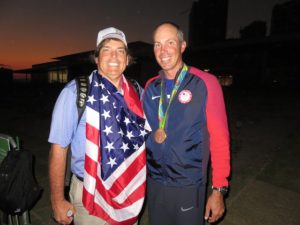
With Matt Kuchar at sunset after he shot a final round 64 to capture the Bronze Medal for the USA!
The men competed first. They qualified by standing in the Official World Golf Ranking (OWGR) over the previous two years, ending July 11th. There were male golfers from 34 countries. By virtue of the limits of four golfers in the OWGR Top 15 and two per country beyond that, 10 countries had one golfer, 23 countries had two golfers and the United States had four qualifiers- Bubba Watson (OWGR No. 6), Rickie Fowler (7), Patrick Reed (13) and Matt Kuchar (15). The field of 60 golfers, first playing in threesomes all four days of the 72-hole stroke play event, was the perfect size to insure an intimate and personable presentation of golf to the world.
Australia’s Marcus Fraser started strong. Opening with an 8-under par 63, followed by a 69 put him into contention but a 72-72 weekend left him without an Olympic Medal. Kuchar rose to the occasion with a sensation 63 in the final round locking up the Bronze Medal early on with a final margin of four strokes. Reed had his best day on Sunday posting a 64 and finishing T11, a meaningless designation in Olympic terms. Despite an opening 73, Bubba came back with a pair of 67s and then a final round of 70 to finish T8, six strokes out of a playoff. Rickie shot a 64 in the third round but did not manage to break par in the other three and finished T37.
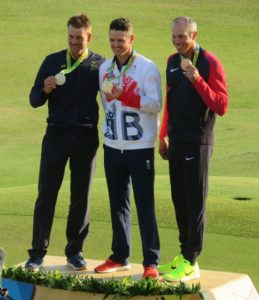
Olympic Golf Medalists: Center Gold- Justin Rose; Left Silver- Henrik Stenson; and Right Bronze Matt Kuchar.
Perfect for television, the head-to-head battle between Sweden’s Henrik Stenson and the likable Justin Rose for Olympic Gold began with Justin leading by one stroke starting the final round. That one stroke lead remained throughout the first nine holes with both players 3-under par for the day. Stenson birdied the par-5 10th hole to draw even and then took the lead when Rose bogeyed the par-4 13th hole. The lead continued to vacillate between the Brit and the Swede with a Stenson bogey on the par-3 14th hole and a Rose birdie on the par-4 15th hole. Stenson birdied the short par-4 16th hole, both parred the par-3 17th hole and the Olympic Gold Medal all came down to the par-5 18th hole as designed.
A brilliant chip by Rose, quite reminiscent of his world debut as a 17-year old in the 1998 Open at Royal Birkdale, was the difference in podium spots. This one didn’t go in but it was close enough for a tap-in birdie and for the Olympics’ top prize as Stenson failed to make his birdie putt to force a playoff.
Afterwards, when asked about his Olympic experience, Rose responded “I just think for me, what was hardening was hearing comments from guys who really weren’t in contention, who spoke positively, about it being one of the best golfing weeks of their lives says it all.”
“Obviously winning the Gold Medal is an incredible experience, but for me it was deeper than just the podium; it was the wonderful spirit here in Rio, which I think speaks to the bigger picture of what a success it’s been.”
That Rio 2016 Olympic Golf success will live on with Rose for the next four years. Rose carries the Olympic Gold Medal on his person all the time and even took it out of his golf bag and put it around his neck to tap in to finish at The Barclays two weeks later back in the States.
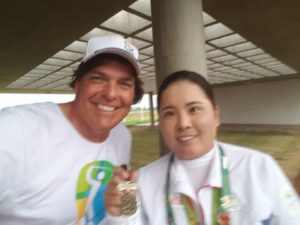
With Inbee Park, Women’s Olympic Golf Gold Medalist and her Gold Medal after she won on Saturday, August 20th in Rio at the Olympic Golf Course.
The women’s competition was equally as exciting but just the opposite of the men’s. Inbee Park started strong and continued strong to walk to the highest level on the Olympic podium to be crowned with with an Olympic Gold Medal. A race for the Silver Medal ensued early in the final round between China’s Shanshan Feng and New Zealand’s Lydia Ko and lasted all day right down to the final group. Another brilliant chip and tap-in birdie on the 18th hole by Ko secured the Silver Medal. China’s Shanshan Feng won Bronze by one stroke over a disappointed and heartbroken threesome of America’s Stacy Lewis, China’s Amy Yang and Japan’s Harukyo Nomura.
Park’s testimony to Olympic Golf was as heartfelt as Rose’s when she said “this is definitely one of the special moments in my golfing career and in my whole life. It feels great. Obviously representing your country, winning the gold, it’s so special. It’s just really all I’ve wanted. I’m just happy.”
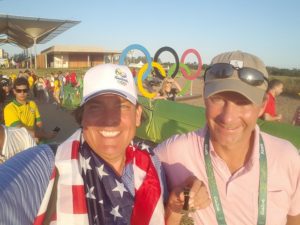
With Gil Hanse at the 2016 Golf Olympics, who designed the Olympic Golf Course with input from World Golf Hall of Famer Amy Alcott.
While Lewis led the American contingent based on a second round 63 and a final round 66, it was really Gerina Piller, playing in the final group with Park and Ko, that looked like she would win an Olympic Medal for the United States. Unfortunately her putter cooled off and she struggled to post a final round 74 and finish T11. The other American lady Olympic golfer was Lexi Thompson who started the final round with an eagle and shot 66 to finish T19.
Like the men golfers, the women golfers came from 34 countries with 11 countries with one golfer, 21 countries with two golfers, the United States with three golfers and Korea with four golfers. Russia’s Maria Verchenova shot a crazy 62 in the final round, including nine birdies and an ace on the par-3 4th hole, to set the new Olympic course record.
The International Golf Federation, led by President Peter Dawson, Vice President Ty Votaw and Executive Director Anthony Scanlon, staged as near perfect golfing competition as could be. Each competition endured one bout of rainy weather yet the golf course remained firm and fast. There was wind to remind us of golf’s Scottish heritage, history and tradition. No wind, no golf. The setup of the golf course, including closely mowed fairways that were lined by Brazilian forever wild, tee and hole locations was brilliantly done.

With Gil Hanse in January 2014 on what was then a well-designed sand box. Truly a life experience to come back 2-1/2 years later to see the golf course completed and witness the 2016 Golf Olympics!
The golf course design itself was divine. On a fairly flat piece of land that sloped from pure sand to the protected low restinga wetlands, the aerial views of the treeless links led to the nearby ocean and were magnificent. The par-71 course opens each nine with a par -5 and finishes with a reachable though not always nor easily reachable par-5. In fact the finishing four holes were designed for the exciting and entertaining Olympic finishes witnessed in Rio. The long and difficult par-4 15th. The short par-4 16th that Stacy Lewis drove yet missed the 15-foot eagle putt. The well bunkered and curvy green on the par-3 17th brought drama that brought out the competitive and fun Spirit of Olympic Golf.
As it turned out, there was nothing like Olympic Golf in golf today. While golf is a worldwide sport, Olympic Golf was widely watched around the world. More importantly, more governments are now actively supporting the growth of golf because it is an Olympic Sport.
As for the future, there remains an Olympic Oddity that the decision of whether golf continues to be an Olympic Sport beyond Tokyo 2020 will be made before Olympic Golf reappears there in four years.
The 120 golfers that came and competed in Rio reignited the Olympic Spirit of Golf.
Olympic Golf is Back and it’s Great!
Congratulations to Inbee Park and Justin Rose, Olympic Gold Medalists, Champion Golfers of the World for the next Four Years.
This article was first published on Bruce Vittner’s Southern New England Golfer (Pg. 25 of Fall/Winter 2016 Issue).




